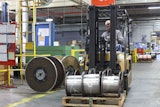
Over the past generation, energy has been a defining issue of our economy. Fluctuations in price and availability of energy have a significant impact on corporate profitability, and the unpredictability of the energy markets are a common source of worry for corporate leaders who have to manage energy supplies.
Manufacturers are particularly susceptible to the vagaries of energy supply and price. They need reliable access to the power and fuel that’s required to run their operations, and they need to be able to pay relatively stable prices to assure that energy costs don’t undermine profits. Manufacturers, more than most, rely on energy, and the uncertainty that has characterized energy markets in recent years has taken a toll.
Fortunately, manufacturers don’t have to remain hostage to the price and availability fluctuations of the energy markets. They can take control, producing their own power and meeting their thermal needs with Independent Energy Districts.
Independent Energy Districts are small power plants that are located within the facility’s campus. They are sized to meet the specific energy needs of the businesses they serve, and they can be configured to operate on most fuel sources, including oil, natural gas, propane, or biofuels. They also provide a remarkable degree of flexibility because if the fuel source that’s being used experiences a spike in price or availability shortages, Independent Energy Districts can be reconfigured to burn a different fuel.
Today, natural gas is a particularly attractive fuel because it combines affordability with availability and sustainability. Furthermore, natural gas prices are expected to stay table for the next decade or more. While natural gas is, admittedly, a fossil fuel, it is much cleaner-burning than oil and coal, and has less environmental impact. Over the next generation, natural gas will serve as the essential “bridge fuel” that will help America transition from fossil fuels to renewables.























